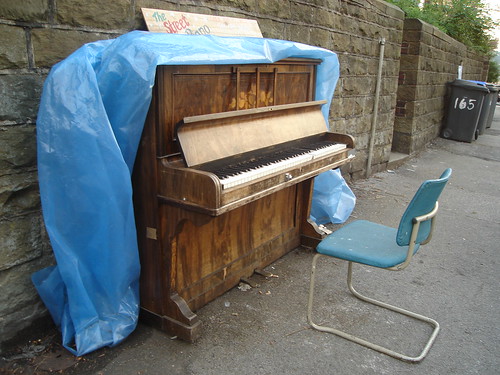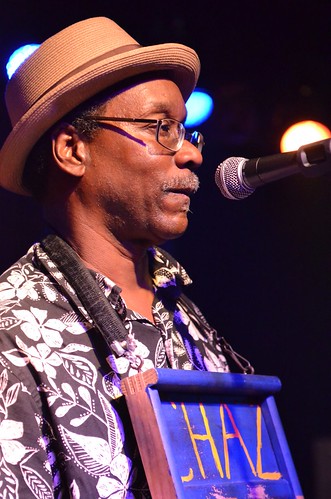
Pages
Saturday, April 30, 2011
Advantageous practice

Friday, April 29, 2011
Books smell

I borrowed this wonderful advert for 'The Smell of Books' from Angela Thomas as an illustration for my keynote at the recent BAAL seminar on language and disadvantage. My point was to illustrate important changes in the communication economy (ie: the rise of self-sponsored writing; of new conventions, new relationships and ideas of appropriacy as well as the usual suspects: multimodal, multilingual and multiscriptual texts) that prompt us to reconceptualize disadvantage and to recontextualize public discourse about 'bad language', and to point out how all this takes place against a backcloth of persistant nostalgia for the book and other fixed forms of print literacy. For me it was a return to some key debates in sociolinguistics and with a title like 'The Trashmaster: popular culture, bad language and writing online', a return to form in grabbing attention. The nub of the question settles on old language prejudices - those that so readily associate with class, although as the seminar discussion uncovered, class is far more fragmented than it was when these debates last headlined in the late 1960s. Same same; different different.
Wednesday, April 27, 2011
Nostalgia for the future

Monday, April 18, 2011
Looking back
 window, a photo by on-the-run on Flickr.
window, a photo by on-the-run on Flickr.September 1994 should be regarded as a landmark in the recent history of literacy studies. Or maybe it should be spring 1996. Either will do, because the autumn of 1994 was when the New London Group first met, and 1996 the date when their jointly authored paper ‘A Pedagogy of Multiliteracies’ was first published in the Harvard Education Review. To explain: New London is the name of the place in the US where the group met, where Courtney Cazden, Bill Cope, Norman Fairclough, Jim Gee and Mary Kalantzis, joined forces with Gunther Kress, Allan Luke, Carmen Luke, Sarah Michaels, Martin Nakata and Joseph Lo Bianco to discuss how literacy pedagogy might adapt to suit the changing context of the late twentieth century. Despite the impressive range of expertise it was an ambitious undertaking, but one that was nothing if not generative and, with the benefit of hindsight, highly influential. By the time the book Multiliteracies was published, the project had gathered momentum, had attracted new voices and was beginning to influence debate amongst literacy educators in much of the English-speaking world, and elsewhere too. At this year's AERA conference the group re-formed -well not all of them - but it was an impressive line-up. There was a fair dose of nostalgia, some great photos of New London in which they all (surprise, surprise) looked much younger and plenty of evidence that they all have more to contribute. Maybe the multiliteracies banner is a little jaded, but it's influence is still felt.
Sunday, April 17, 2011
Migrations
Friday, April 15, 2011
Identity blues
Dorothy Holland and William Lachicotte have a great chapter in the 2007 Cambridge Companion to Vygotsky. They identify two tracks in identity theory, one is organised around the idea of a coherent sense of self and can be traced back to Erikson - with obvious connections to notions of psychological well-being. The other runs back to Mead, the formations that take place through social interaction and symbolic communication and suggests the possibility of plural identities. This allows the crafting of identities that may be a sort of bricolage of different social roles, a more creative way of inhabiting the various postions and roles afforded us by society. I don't know how far that confers us with agency, but it makes me quite happy to be a 50-something academic who attends conferences and loves live music. The video of Little Freddie King was taken at the French Quarter Festival in New Orleans on my Blackberry as I went (?) from one meeting to the next.
Tuesday, April 12, 2011
New Orleans!
Saturday, April 02, 2011
Crowdsourced music
Imogen Heap's latest composition has a creative take on music in the digital age. Making extensive use of social media she has encouraged audience involvement in her latest work 'Lifeline' by incorporating the sounds and words sent to her. Now you could be picky and say that this is just a sophisticated marketing ploy, an easy way of gathering material and highly dependent on free contribution rather than open participation - but that would be unfair. The whole process springs from a different way of looking at the world, and one that reminds me of Colin and Michele's idea of mindset 2.0. In essence there's a distinctively new relationship between producer and consumer here, and a radically different take on where ideas come from and who owns them. Crowdsourcing is an interesting way of describing this because it leads us to ask for more precision in determining who the crowd is in the first place. The crowd here isn't 'the public' but it is 'a public'. It's not everyone, but it could be anyone. Similarly the crowd is not the audience but it may be part of the audience. No, the crowd is composed of a fluid coming and going of people who are part of a transient and distributed network - inhabitants of what Gee calls an 'affinity space'. There are clearly some resonances with other emerging social and political groupings, but I suppose the distinctiveness is around leadership and authorship (or ownership). Heap's achievement is, after all, still hers albeit with a little help from her friends, but it's framed by new ways of thinking about things, new practices and shifting networks of connection. Sell our sounds back to us, Imogen, or set them free: that's the question.
Friday, April 01, 2011
Getting mobile


